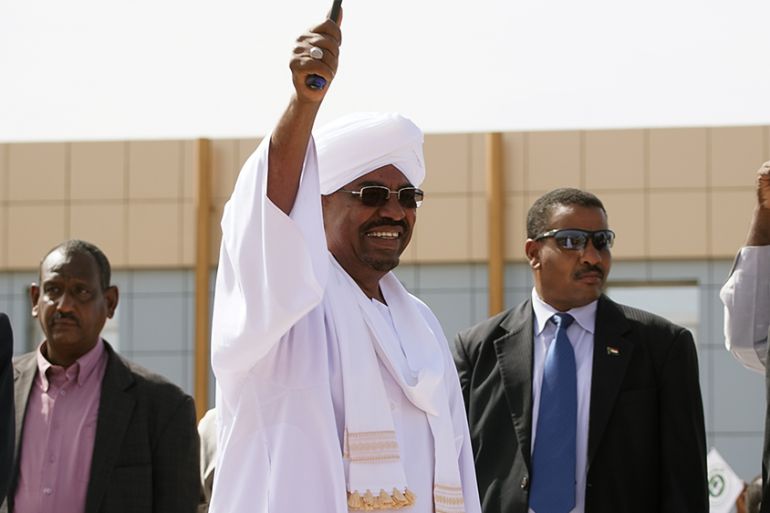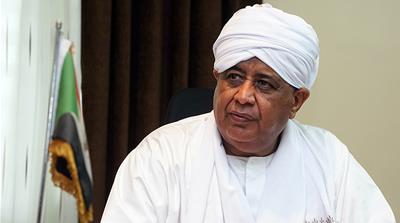Boycott call dampens Sudan’s election spirit
Sudanese will vote for a new parliament and president on April 13-15 though the opposition says it will shun the event.

Khartoum, Sudan – On a vast open space next to the Nile, hundreds of people are seated around plastic tables, sipping sweet, milky tea from small cups.
A large screen displays one of President Omar al-Bashir’s last campaign rallies ahead of the country’s general elections, due to start on Monday.
Keep reading
list of 4 itemsOusted President al-Bashir in Sudan military hospital, army says
Sudan’s pro-democracy activists mark anniversary with protests
Sudan military leader urges troops to back democratic transition
From the back of a van, a man campaigning for a little-known presidential candidate makes a last-minute attempt to garner support.
But few of the tea drinkers are paying attention to the political messages, instead chatting along with their friends.
Most of Sudan’s main opposition groups have vowed to boycott the polls that they said are guaranteed to lead to the extension of the 25 year rule of Bashir.
The vote is being held amid escalating violence in Darfur, Blue Nile and South Kordofan states and complaints about the strengthening of presidential powers and oppression of political dissent.
Anger is still rife over the violent crushing of protests in 2013 in which rights groups said 170 people were killed.
Blog: Sudan elections – what elections?
Student Abdullah Abdurahman said he has not registered to vote because the outcome is obvious.
“This would have been my first chance to vote but it’s a waste. There’s no one that I could have given my vote to,” the 21-year-old told Al Jazeera.
‘Fake elections’
In addition to Bashir, 14 candidates other are running. There are more than 13 million registered voters. There are 11,000 polling stations across the country and voting is scheduled for three days.
|
|
The Irhal (depart) campaign is leading the calls for a boycott and holding rallies to raise awareness about the the elections, and the country’s political situation at large.
Mariam al-Sadeq al-Mahdi, a member of the national Umma party and a leading figure in the movement, said the campaign is a way to boycott the “fake elections in a proactive way”.
“We are saying this government must depart, because their policies are devastating Sudan. We have many problems but their policies are killing the economy, Sudan’s unity, the security and peace of Sudan,” she told Al Jazeera.
In January 2014, the ruling National Congress Party initiated a “National Dialogue” with the country’s fragmented opposition to achieve lasting peace and unity in the war-torn country.
But the process has stalled with the withdrawal of participants such as Ghazi Salahuddin Atabani’s “Reform Now” party.
![Ghazi Salahuddin Atabani, the leader of Reform Now party [Sorin Furcoi/Al Jazeera]](/wp-content/uploads/2015/04/6615729237ec45d694457ed481179c51_18.jpeg)
“All they’ve done since they initiated the talks show they’re not serious about the dialogue,” Atabani has said.
“What they want is legitimacy and elections because for them, legitimacy is more important than the national dialogue.”
A military source who spoke to Al Jazeera on condition of anonymity said that legitimacy through elections is very important for the government, to avoid action taken over the International Criminal Court’s arrest warrant for Bashir.
Should he lose power, his allies fear that he could be extradited to The Hague.
Ibrahim al-Ghandour, deputy chairman of Bashir’s National Congress Party, said postponing the elections – a demand from the opposition – would be a constitutional breach that would leave Sudan without a legitimate government.
“We are in a region of turmoil, in South Sudan, east, west and north – Boko Haram, al-Shabab, al-Nusra Front and ISIL,” he said, referring to armed groups active in African countries and the Middle East.
“We can’t leave the country without a legitimate government,” Ghandour said.
Video: Sudan political activists afraid to speak out
He insists that the government is committed to a national dialogue after the election, whatever the outcome of the talks would be.
 |
| Ibrahim al-Ghandour, deputy chairman of Bashir’s National Congress Party [Sorin Furcoi/Al Jazeera] |
“Even if the opposition say they want an early election we are ready.”
Ghandour said he hopes the opposition will realise the government is willing to go forward and build Sudan.
“We must agree on who will govern and how. That will only come via democratic means which means elections.”
In December 2014, the main opposition coalition, the National Consensus Forces (NCF), the armed rebels alliance Sudan Revolutionary Forces, and the Confederation of Civil Society Organisations (CCSO) signed the Sudan Call declaration, in which they called for the dismantling of the National Congress Party (NCP), to be replaced by a democratic state.
Attack on press freedom
In recent months, security services have stepped up arrests of journalists and politicians, and amendments to the constitution passed in January give greater power to the state’s security apparatus.
![Madiha Abdalla, editor-in-chief of the Communist party's al-Midan newspaper [Sorin Furcoi/Al Jazeera]](/wp-content/uploads/2015/04/b04919c0ec3a4aa5ace32e3197fb853f_18.jpeg)
The amendments also give the president the power to appoint state governors, who were meant to be elected in the April polls.
On February 16, the whole print runs of 14 newspapers were confiscated by security forces without any reasons given.
Madiha Abdalla, editor-in-chief of the Communist party’s Al-Midan newspaper, said not knowing if reports would eventually reach the newspaper stands is a reality editors in Sudan have to deal with every day.
Contents that are off-limits include coverage of the International Criminal Court’s arrest warrant for Bashir over alleged war crimes, Darfur, and any criticism of the president.
“Our policy is not to comply with these regulations and as a result we faced closure and confiscation several times,” Abdalla said.
She has faced charges of publishing false information and instigating violence against the government, and her paper has been closed down several times. But she still continues to publish what she believes needs to be reported.
Q&A: ‘Violence is the last thing we need in Sudan’
“When we couldn’t print our issues we continued with publishing our content online. You cannot put limits and conditions on freedom of expression.”
Despite widespread anti-government sentiments, supporters of Bashir are not hard to come by.
By the river Nile, student Kamal Sediq, said that he will be voting for the incumbent president because he is the only one experienced enough to rule the country.
And Arousa Adam Musa, who earns her living by selling tea brewed over burning coal, loudly proclaimed her support for Bashir: “He is fantastic! I will be the first in line to vote Monday morning.”
Follow Fatma Naib on Twitter @FatmaNaib
